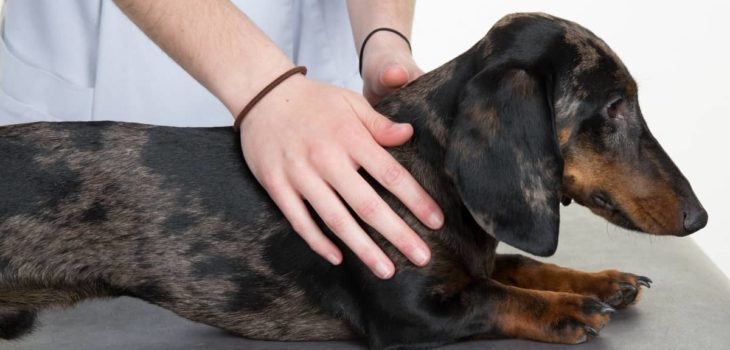Dachshunds exhibit their typical long backs that give them the name of hot dogs, but back support for Dachshund may be a requirement if health problems occur. The most encountered back health problem in Dachshunds is a condition called intervertebral disc disease.
Helping your Doxie deal with back problems can include many different things, from vet visits to a dog back brace. There’s no need to worry extensively but pondering how can I help my Dachshunds back, will reveal many options.
What Can Go Wrong With A Dachshund’s Back?
There are a number of health issues around the elongated spine of the Dachshund breed. The most commonly encountered one is a condition known as intervertebral disc disease (IVDD). This condition displays two forms in which it can develop.
Type I IVDD is usually present in shorter dogs with a gene mutation that makes their legs unusually shorter compared with the body. Dachshunds are the prime example of a breed with very short legs.
The way type I IVDD manifests is by prematurely calcifying the inner layer of the vertebral discs from a very early age. A type II IVDD also calcifies the vertebrae but at a slower pace for a longer period. That is why other larger dogs can develop type II IVDD, but it can still occur in Dachshunds as well.
Ultimately, both types of IVDD lead to most of the same results. Some of these results can include disc ruptures, slipped discs, rigidity, and even possible nerve damage. A Dachshund may never encounter any of these issues, but the possibility is there, and preparation can benefit them.
Providing Help To A Dachshund’s Back
Knowing the ways in which a Dachshund’s back can have health complications is one stepping stone in caring for them. Many things can be done to assure their health and well-being, even after the injury to their spine.

Back support for Dachshund breed
When it comes to providing the best care for a Doxie’s spinal cord, a dog back brace comes to mind. There are legitimate concerns about safety with questions like, are back braces good for Dachshunds? Anything that provides back support for Dachshund can’t be harmful, in fact, it may even be recommended.
Seeking veterinary professionals’ advice can put the mind to ease and provide assurances to the use of dog back braces. Proper support for the spinal cord is highly useful in the recovery stage as it stabilizes the spinal column.
Caring for a Dachshund’s injured back
Any back problems need to be promptly dealt with by a medical professional. There could be cases where surgery might be needed, and as such medication will be prescribed. Wondering what can I give my Dachshund for back pain will greatly depend on the situation.
Medication to reduce inflammation is one possible recommendation, or even some consisting of steroids. Any form of medication is provisional in the context, whether it’s to treat pain after or post-surgery.
Preventative Care And Back Support For Dachshund
Dealing with spinal-related health issues in a Dachsund is sometimes expected, but there are possible preventative measures to take.
Peremtive back support for Dachshund
A dog back brace is one of the greatest ways to provide back support for Dachshund. Using a tool like this can even come as a preventative measure to maintain a healthy spinal cord. Knowing just how bad an injured back can go for a Dachshund, it makes sense to help support it.
Maintaining weight
A Dachshund that puts on extra weight will only add more strain to its back. This would mean that maintaining a healthy weight can go a long way in preventing further spine complications. Consult the vet regularly to make sure your Dachshund has an appropriate weight.
Avoid unnecessary strain
Back support for Dachshund does not necessarily imply the use of a dog back brace. Helping your Dachshund go up the strains by carrying it would also be a great preventative measure. This breed is small so it won’t be extra hard or heavy to carry.
It can also be a good idea to invest in a doggy ramp, so jumping on the couch won’t require jumping at all. Trimming your Dachshund’s nails regularly will also assure it won’t alter its gait and further cause back issues.
A little support with the food bowls can also provide some much-needed help. Putting the food and water bowls on higher racks will help maintain the neck in a more neutral position. This will ultimately help maintain a Dachsund’s back even more.
Using a harness and not a collar has the great benefit of not putting pressure on the neck when walking. It may not seem like much at first, but everyday neck strain can affect the spine long term.
Conclusion
It’s never easy dealing with any health issues your dog may face. Some severe cases of back injury can lead to paralysis if not subject to care in time. Even with all the preventative measures in place, there is a possibility that some problems can’t be avoided. However, treatments and care options can be used to make a Dachshund with spinal injury more comfortable and treat symptoms.

FAQs
[rank_math_rich_snippet id=”s-d61df381-6806-4ee1-9f84-6c16ee2b7cb6″]




